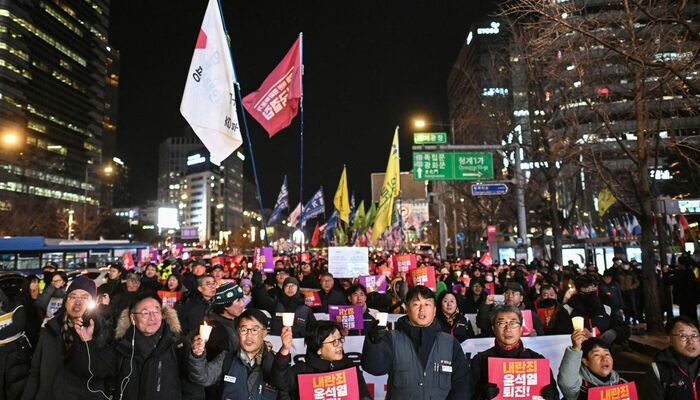South Korea is engulfed in political chaos following President Yoon Suk Yeol’s controversial attempt to declare martial law. The abrupt decree, aimed at accusing the opposition of “anti-state” activities, triggered widespread outrage, with growing demands for Yoon to resign. Protesters, unions, and political leaders have united against the president, claiming his actions threaten democracy.
Impeachment Efforts Gain Momentum
Six opposition parties have submitted a bill seeking Yoon’s impeachment. The Democratic Party, the main opposition group, is also drafting treason charges against Yoon, as well as his defense and interior ministers. These moves reflect a unified effort to hold the administration accountable for what many view as an unprecedented abuse of power.
In an extraordinary confrontation, lawmakers forced their way past soldiers into parliament, where they swiftly nullified the martial law decree. This bold legislative action showcased the determination to resist authoritarian measures.
Massive Public Backlash
Protests erupted across the country, with demonstrators demanding Yoon’s resignation. South Korea’s largest union group announced strikes until the president steps down, intensifying pressure on the administration. Critics argue that Yoon’s accusations against the opposition, including claims of North Korea sympathies, are baseless and inflammatory.
Protester sentiments reflect widespread fears over the erosion of democratic norms. “We cannot allow such blatant misuse of power,” said one demonstrator in Seoul’s central square.
Read: King Charles and Queen Camilla Host Qatari Royals
Top Officials Resign
In the wake of the martial law crisis, several key officials, including Yoon’s defense minister and chief of staff, submitted their resignations. Their departures signal internal fractures within the administration and a growing recognition of the untenable political situation.
The crisis has also drawn criticism from international observers, who warn that such actions could undermine South Korea’s stability and global standing.
President Yoon’s Justification Falls Flat
In his late-night address, Yoon declared martial law, accusing the opposition of “anti-state” activities and undermining national security. He alleged the Democratic Party sympathized with North Korea, an accusation rejected as baseless by opposition leaders.
This dramatic move came amid escalating tensions between the ruling and opposition parties. However, Yoon’s attempt to justify martial law backfired, further alienating his allies and emboldening his critics.
Democracy at a Crossroads
South Korea now faces a critical juncture. The crisis has exposed deep political divisions and highlighted the fragility of democratic institutions. Opposition leaders are calling for unity in the face of what they describe as an authoritarian threat.
As the nation braces for further developments, the demand for accountability remains loud and clear. The political turmoil underscores the urgency of preserving democratic principles in the face of crisis.
Follow us on Google News, Instagram, YouTube, Facebook,Whats App, and TikTok for latest updates
